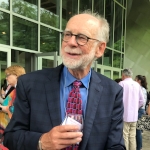VARIETIES OF RELIGIOUS EXPERIENCE, IN EARLY INDIA
-
|
14 Nov
16 Nov
2022
|
Indian Intellectual Traditions
|
|
Richard Davis
|
“In religion other countries are paupers;” exclaimed the American author Mark Twain during his 1896 speaking tour, “India is the only millionaire.” Where did this fabulous wealth come from? This set of talks will propose an historian’s answer. It will describe six principal modes of religion in early India, from the Vedic period up to the Gupta era. Together these form the foundation for many of the religious developments that have taken shape over the succeeding centuries in India, up to the present time. Each talk will focus on one of these modes, in its early formation, its fundamental ideas, and the debates surrounding it. These are:
(1) Sacrificial religion
(2) Renunciatory religion
(3) Imperial religion
(4) Disciplinary communities
(5) Visual religion
(6) Devotional religion
These talks are based on a book project, titled “Yogis, Monks, Nuns, and Dharma-Kings: Religious Cultures of Early India,” a narrative history of early Indian religious cultures. These talks will explore modes of religion as they are borrowed, shared, transformed, and debated among various religious communities.
Tea: 5:45 pm , Lecture: 6:15 - 8:30 pm IST
Physical Lecture with live streaming on ZOOM
Duration -
November 14, 15, 16, 2022
Timing: 6:15 - 8:30 PM IST
Fees
Rs. 3,000 (For student discounts registrations kindly email info@jp-india.org)
Registrations Closed

Richard Davis
Richard H. Davis is Research Professor of Religion and Asian Studies Programs at Bard College, Annandale-on-Hudson, NY, where he taught from 1997 to 2022. Previously he taught as assistant and associate professor in the Religious Studies Department at Yale University, 1987-1997. During that time he was also involved in helping establish the Committee on South Asian Studies of the YCIAS. He received a BA from the University of Chicago, an MA from the University of Toronto, and his PhD in the Department of South Asian Languages and Civilizations at the University of Chicago in 1986.
His primary research interest is in the long-term history of Hindu religious traditions. His most recent publication is The Bhagavad Gita: A Biography (Princeton University Press, 2014), which traces this important Hindu text over two millennia of its reception history. He is author of four other books: Ritual in an Oscillating Universe: Worshiping Siva in Medieval India (Princeton, 1991), Lives of Indian Images (Princeton, 1997, winner of the 1999 A.K. Coomaraswamy Award), Global India, circa 100 CE: South Asia in Early World History (AAS, 2010), and A Priest's Guide for the Great Festival (Oxford, 2010). He has edited two volumes, and also wrote the text for a catalog of Indian religious prints, Gods in Print: Masterpieces of India’s Mythological Art (Mandala, 2012). He has received fellowships from the Guggenheim Foundation, the National Endowment for the Humanities, the American Institute of Indian Studies, and the Fulbright-Hayes Fellowship.
He is currently completing work on a book-length history of religions in early South Asia. This narrative history explores the origins and early development of the multiple religions that found their place in the Indian landscape in ancient and classical times: Hinduism, Buddhism, Jainism, and other less-known religions. The time range in this text runs from the earliest archeological evidence of religious practices in the subcontinent up to the period around 650 CE, a point of transition from “classical” or “late antiquity” to “early medieval” historical periods. His lectures at Jnanapravaha will be based on this current work-in-progress.